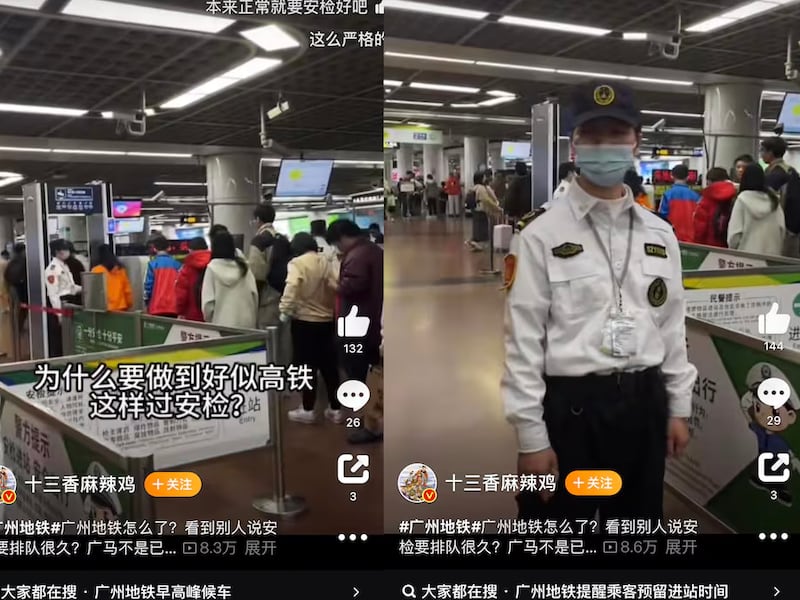Chinese subway commuters in the southern city of Guangzhou now have to go through security checks similar to those at airports in the wake of a string of violent attacks in public places.
The additional checks came amid reports that schools and other public venues have been rushing to buy traffic barriers in the wake of the fatal Nov. 13 Zhuhai car attack.
“For the safety of passengers, please cooperate with security checks in an orderly manner when entering subway stations,” the Guangzhou Metro said via its official account on Weibo on Dec. 8.
Social media users posted photos and video from the network showing long lines of people waiting at security checkpoints outside Tianhe Bus Station, Tiyuxi Road and Zhujiang New Town stations during rush-hour on Dec. 9, with signs set up in the entrance to stations that read: “People through the door, objects through the machine.”
The measures come as authorities across China step up pre-emptive measures in the wake of a growing number of “social revenge” attacks.
At least 35 people were killed and 43 injured when a driver rammed his car into a crowd at a stadium in Zhuhai city, prompting a rare intervention from President Xi Jinping.

“All items you carry must go through the security machine,” the Guangzhou Metro notice said. “If there is an alarm when passing through the security door or security machine, the security inspector will manually re-check by opening and searching the bag.”
“They will release it as soon as they have confirmed that there is no problem,” it said, warning passengers not to bring “flammable or explosive” items into Metro stations.
RELATED STORIES
China plans big data warning system to prevent public killings
China reels after string of public stabbings, car attacks
China to probe marital, neighbor disputes in wake of car attack
One social media video showed a security guard telling passengers to pass through the scanning gate, while the user commented that the security was similar to those seen on the high-speed rail network.
Weibo users made snarky comments about the long lines at the checkpoints, with one commenting: “Terrorists don’t need to get through security now; they have a much better target in those long lines outside the door.”
Others complained that Guangzhou Metro had issued the notice about additional security late on Sunday, giving people scant time to readjust their travel plans.
A Guangzhou-based legal professional who gave only the surname Chen for fear of reprisals said the authorities are extremely nervous in the wake of a slew of vehicle attacks and public stabbings in recent weeks.
“They’re stepping up security inspections, but this is just an attempt at suppression,” Chen said. “Actually, these vicious attacks have too much social control as their root cause.”
‘Can’t solve' the root causes
A Beijing-based legal professional who gave only the surname Wu for fear of reprisals said he believes the authorities are keen to stop any more brutal public attacks.
“But they can’t solve the deep-seated social conflicts [that caused them],” Wu said. “It’ll just cost them a whole lot more in labor, and increase the inconvenience to the general public.”
The move came amid media reports that orders for traffic safety barriers for schools, shopping districts and other public places have soared in the weeks since the Zhuhai killings.
Chinese companies told Hong Kong’s South China Morning Post newspaper that they had seen substantial increases in product inquiries and purchases in November compared to earlier months, with some firms doubling their workforces to cope with urgent orders to be filled before the festive season at the end of January.
A business owner specializing in giant granite balls that would stop a car or larger vehicle in its tracks said sales had skyrocketed “several times over” since the attack, forcing him to call in retired staff to help with the sudden spike in demand, the paper said.
China’s Communist Party is also stepping up the use of big data to predict people’s behavior in a bid to identify “social risks” and nip potential violent attacks in the bud.
Translated by Luisetta Mudie. Edited by Malcolm Foster.
